This post may contain affiliate links. Please read our disclosure policy.
A simple lemony shortbread crust with a tart, refreshing lemon custard, these gluten free lemon bars are so easy to make. Perfect for any occasion, from potlucks to bake sales.
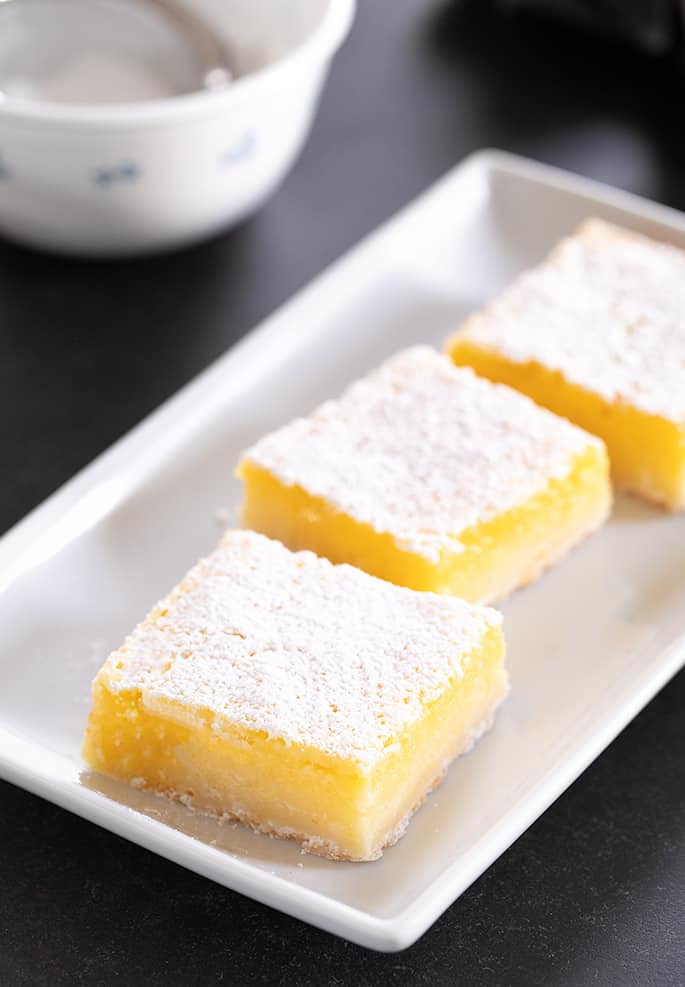
Table of Contents
- What makes this recipe for gluten free lemon bars so special
- Gluten free lemon bar ingredients
- What does the filling in these gluten free lemon bars taste like?
- How to make these gluten free lemon squares
- Tips for making the best gluten free lemons bars
- Storing leftover gf lemon bars
- Gluten free lemon bars: Ingredients and substitutions
- FAQs
- How to make gluten free lemon bars, step by step
- Gluten Free Lemon Bars Recipe
What makes this recipe for gluten free lemon bars so special
Smooth, creamy and tart classic gluten free lemon bars seem to be beloved by nearly everyone. If you don't love them, or anything lemon flavored, then this recipe is not going to be for you!
But if you're a lemon lover (and if you are, then you have to try our lemon pound cake and our lemon meltaway cookies), you are going to love these bars. The crust is the perfect blend of chewy and crunchy, and the custard is lemony cool and fresh.
Gluten free lemon bar ingredients
Lemons may be the first thing you think of when you think of these bars, but let's talk about another very important ingredient: the gluten free flour blend.
The right gluten free flour blend for these gf lemon bars
I do specify my gum-free gluten free flour blend for this recipe, which is made with a mix of mostly superfine white rice flour, plus potato starch and tapioca flour/starch. There is no xanthan gum in this recipe.
I’ve found that it makes for an almost chewy, gummy filling. It’s not nearly as important for the crust as it is for the filling.
You do need a scale to make the blend, but if you must purchase a blend to use, I’d try using Cup4Cup. It contains xanthan gum, but less than Better Batter, and is a very light, starchy blend.
More gf lemon bar ingredient notes
Along with gluten free flour, you'll also need the following to make these easy gluten free lemon bars.
- Sugar – we use both granulated and powdered sugar in the crust and filling to balance out the tartness of the lemon and tenderize the crust
- Lemon juice – this is the star of the show, so use fresh lemon if you can (more on that below)
- Lemon zest – if you love the taste of lemons, you'll find that nothing has that concentrated flavor like lemon zest
- Butter – gives the buttery shortbread crust its richness and is a flavor delivery system!
- Eggs – eggs provide the filling with its creamy structure
What does the filling in these gluten free lemon bars taste like?
You’ll need at least one fresh lemon for the lemon zest so your crust, not just your filling, is pucker-worthy. These lemon bars are no joke. You’ll never confuse them with any other flavor. I believe the term is ROBUST.
If you’ve ever had lemon curd, which is similar to a lemon pudding or custard, this filling will taste similar. Unlike lemon curd, though, the filling in these bars is baked, not cooked. It will be firm enough to bite into once it’s set in the refrigerator.
How to make these gluten free lemon squares
To make these bars, you have to place the pan in the oven twice. I promise it’s not a big deal, though.
The crust is a relatively sticky dough that’s made with our basic gum-free gluten free flour, confectioners’ sugar (to keep it light), lemon zest, salt, and melted butter. Just press it into the pan with an offset spatula (or a spoon or tamper) and bake it just until it’s set.
There’s no leavening in the crust, so it won’t rise very much at all. Baking it alone prevents it from getting soggy when you add the filling, and from having to overbake the filling just to get the crust firm enough to hold it.
As the crust is cooling, make the filling by whisking eggs, granulated sugar, baking powder and lemon juice. Pour the filling right on top of the blind-baked crust and pop it back in the oven to bake until the filling barely jiggles when it’s shaken from side to side.
As the filling is baking, if you peek in the oven (not advisable, but if you can’t help it) before the last 7 or 8 minutes, you’ll think that the bars will never actually set. It will seem almost like a liquid for most of the baking time. As long as you haven’t changed the recipe and your oven is at the proper temperature, it will set.
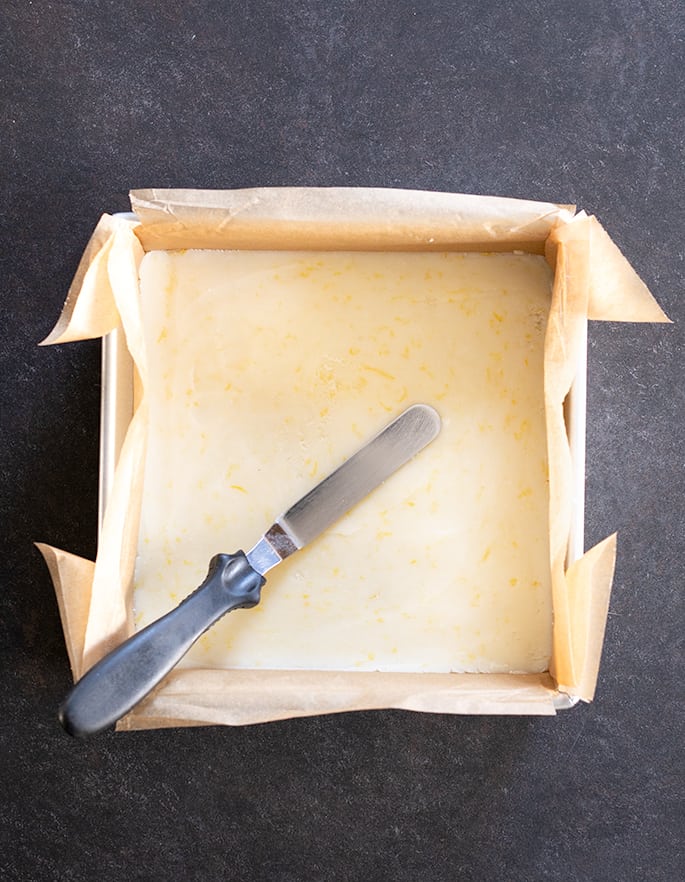
Tips for making the best gluten free lemons bars
Measure your gluten free flour blend carefully
Properly measuring gluten free flour is extremely important in any recipe, but it's especially so in one that has a smooth, custard-y filling like this one.
The mistake that many people make is scooping flour straight from the bag or jar. You might think that just because the gluten free flour hits the one-cup line, you've got one cup.
But here's the thing: When you scoop and drag, you compress the flour into the measuring cup. This means you'll end up with more gluten free flour than you need. Plus, cup sizes are not standard, so my brand of cup might be more or less than your brand of cup.
The only reliable way to measure out flour, or almost any dry ingredient, accurately is to use a kitchen scale. This gluten free lemon bar recipe calls for 233 grams of flour, so put the measuring cup on the scale, zero it out, and then add flour by the spoonful until you hit 233 grams.
Promise you'll use freshly squeezed lemon juice in your gf lemon bars?
Conventional lemons are available year-round, but we do tend to get the best ones in the dead of winter. A little sunshine for an overall dreary season, I guess!
Meyer Lemons, which are thought to be a cross between oranges and lemons, aren't available year-round. They seem to be most plentiful in the middle winter through the very early spring (why do I always want to capitalize ‘spring' but leave winter as is?)
All this is to say … like in our gluten free lemon pie, there is really just no excuse for using bottled lemon juice. I'll never be able to grow my own lemons, but I'll bake with them forever and ever because lemon-flavored things are almost as universally loved as chocolate-flavored things.
I vow never to use bottled lemon juice in baking (or otherwise for that matter). Baking and cooking mean applying heat, and heat intensifies flavors. If the flavor isn't great at the start, just wait until you bake with it.
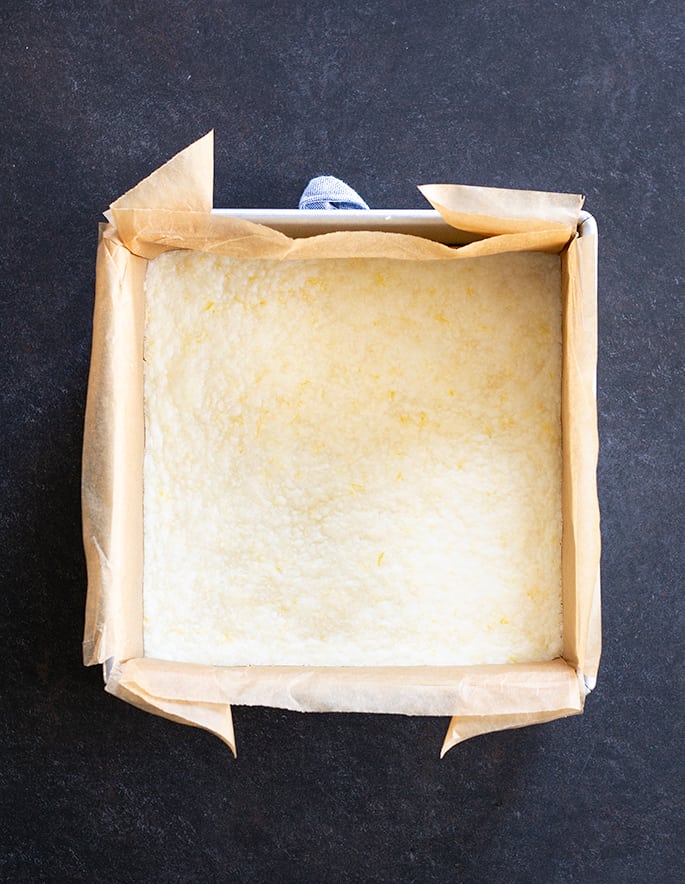
Don't forget the parchment paper!
These gluten free lemon bars are not going to be super firm when you pull them from the oven. Even after you let them cool and refrigerate them, you'll still find the lemon filling to be on the soft side.
For this reason, it's imperative that you don't forget to use parchment paper when preparing your baking pan. Parchment paper will make clean up easier by creating a barrier between the lemon bars and the pan, but more importantly, the paper will give you the support you need to lift the squares from the pan in one piece.
Give your gluten free lemon squares time to set up
We'll be straight with you: It's going to be hard to resist this incredible gluten free lemon dessert once it's out of the oven. The temptation to cut out a tiny bar for a little taste will be great. Please, try to resist.
As previously explained, the lemon filling of these bars is similar to lemon curd — but only if you allow it enough time to set in the refrigerator. If you try to bite into these before they've had time to chill, they won't have the right bite.
Storing leftover gf lemon bars
If you plan to eat all your gluten free lemon squares on the same day, it's perfectly fine to leave them out at room temperature on your kitchen counter (after letting them chill for a couple of hours so they can set.)
But if you're planning to enjoy them for the rest of the week, you should definitely store them in the fridge in an air-tight container. This is because the soft lemon filling won't stand up to higher temps.
Can you freeze lemon bars?
Yes, you can totally freeze lemon bars to enjoy later.
To start, let your lemon bars cool completely. Cut them into squares, but don't top them with powdered sugar or any other topping.
Then, stick them in the freezer for about an hour so they can really firm up, and then wrap each bar individually with cling wrap. Then, store them in the freezer.
Your bars will stay good on ice for up to three months, and won't freeze solid, so you won't have to defrost them for long. You can just transfer your lemon bars to the fridge and let them sit until they're at your desired temperature and texture. Before serving, add your powdered sugar, whipped cream, or whatever topping you desire.
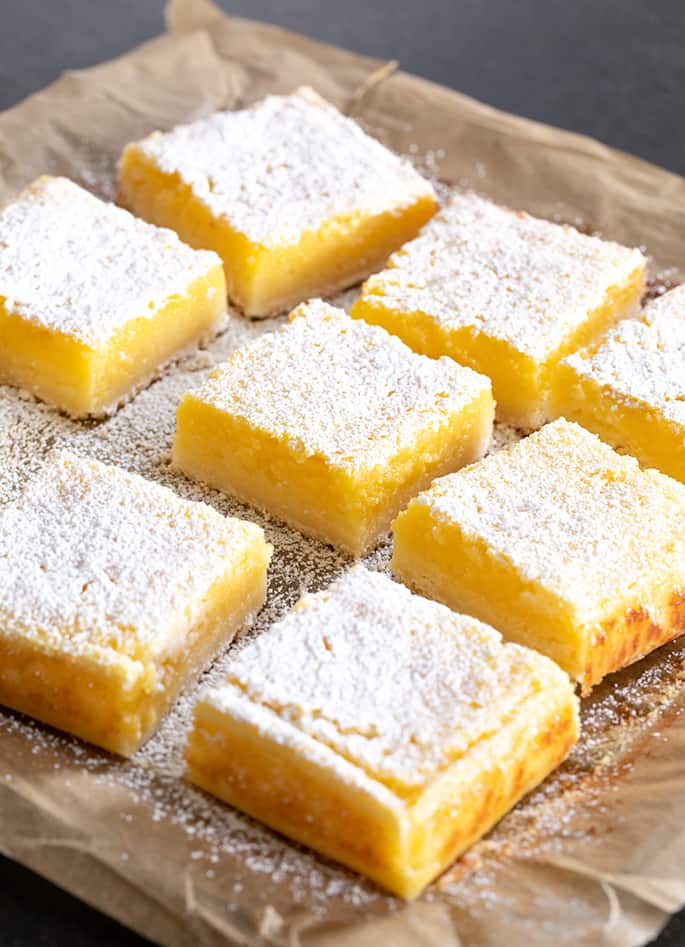
Gluten free lemon bars: Ingredients and substitutions
There are dairy, eggs, and two types of sugar in these decadent lemon bars. I don't regret any one of those ingredients, but if you can't have one of them, here's what I'm thinking:
Gluten free dairy free lemon bars
The only source of dairy in these bars is the butter in the crust. That's good news if you're dairy-free. The crust should still turn out if you replace the butter with half Earth Balance buttery sticks and half Spectrum brand nonhydrogenated vegetable shortening.
You can also use Melt Vegan Butter or Miyoko's Kitchen Vegan Butter in place of the butter entirely. Watch the salt, though, since butter replacements tend to be quite salty (unlike shortening, which contains no salt).
Can you make this recipe for gluten free lemon bars egg-free?
There are 4 eggs in this recipe. I'm afraid I don't believe that you can replace all 4 of them with an egg substitute and achieve anything like the texture of these smooth, creamy custardy bars. So sorry!
Gluten free, vegan lemon bars
Unfortunately, I don't think there's enough give in this gluten free lemon bar recipe to make them vegan — primarily due to the egg issue described above.
Sugar-free gluten free lemon bars
The confectioners' sugar should be able to be replaced with Swerve brand powdered sugar replacement. That tends to work quite well. You can try replacing the granulated sugar with Swerve brand granulated sugar substitute or Lankato monkfruit granulated sweetener.
Sugar replacements tend to be drying, though, so you may have to add some moisture to the filling. Try another tablespoon of freshly squeezed lemon juice.
Gluten free lemon bars…without lemon?
Since you've already promised to use freshly squeezed citrus in this recipe, we don't have to revisit that point. If you'd prefer a lime-flavored bar, try my key lime pie bars. They're similar in texture, and simply amazing. If you're looking for a bar with a completely different texture, try our gluten free pumpkin bars, which have more of a cake-like texture, not a soft fruity filling.
More gluten free lemon dessert recipes
Have you got a big bag lemons sitting on the counter? Wondering what to do with the rest of them? Let me help! Here are a few more of my favorite gluten free lemon dessert recipes.
- Gluten Free Lemon Cookies – Buttery-rich and light, these delightful lemon cookies melt in your mouth — seriously! And they couldn't be easier to prepare, requiring only 15 minutes of prep time.
- Gluten Free Lemon Brownies – I love chocolate as much as the next person, but sometimes I crave something different. These lemon brownies offer the chewy consistency of a brownie with the bright flavor of citrus.
- Gluten Free Lemon Cake – If you've ever had the lemon cake at Olive Garden, you know it's the stuff that dreams are made of. Try my copycat recipe, and you can chow down on this cake whenever you want.
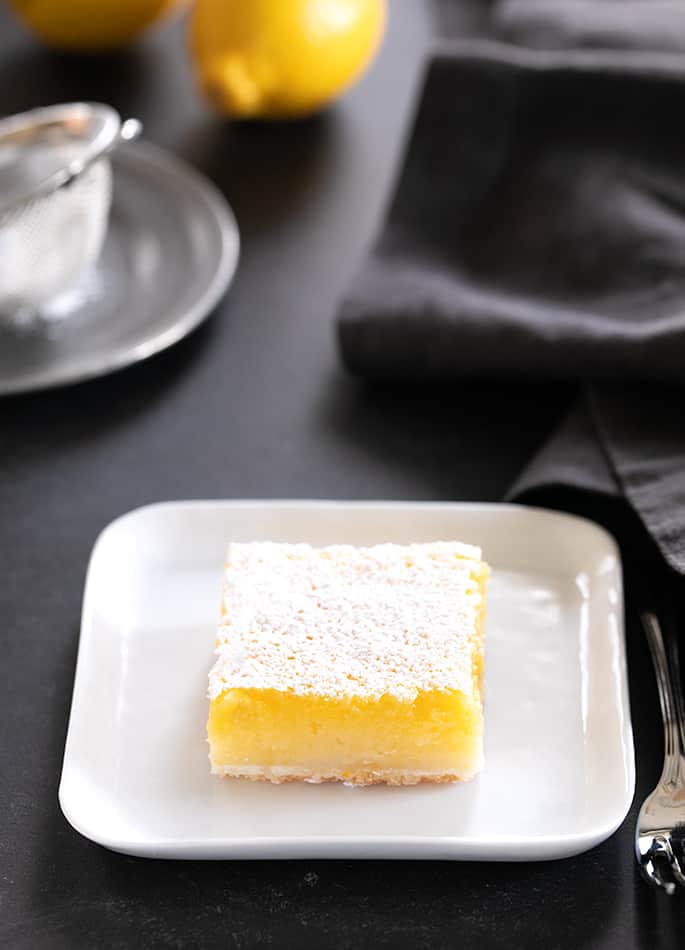
FAQs
Yes! Lemons are naturally gluten free, so if you pick the fresh stuff from the grocery store, you're good to go.
No, most prepared lemon squares are not gluten free, because they are generally made with wheat flour, both in the crust and the custard filling. This recipe is written to be gluten free, with gluten free ingredients, so if you keep your workspace free of contamination, your lemon bars will be safely gluten free.
One average-sized fresh lemon, when squeezed, will produce about 3 tablespoons of fresh lemon juice. Our gluten free lemon bar recipe requires 2/3 cup of juice (or just over 10 tablespoons), so you'll need about 4 lemons to get enough juice.
I don't recommend using bottled lemon juice, as it tends to be bitter, and baking with it will only intensify its bitterness. There are some bottled lemon juice brands, like Best Select, that people swear taste like fresh-squeezed. If you have a brand of bottled lemon juice that has juice you love the taste of, then use it!
No, this recipe calls for rice-based gluten free flour blends, and almond flour is a high-fat flour that does not perform the same in baking at all. You'd need a recipe developed specifically for almond flour to make a successful lemon square with it.
Yes, you can make these lemon squares with a graham cracker crust if you'd like. Just follow my gluten free graham cracker crust recipe, which uses my homemade graham crackers.
There are a few reasons why your gf lemon squares may be gooey:
You didn't use the right ratio of ingredients — you may have used too little gf flour or too few eggs; you may have also added too much lemon juice. Measuring carefully, and by weight wherever possible, avoids unbalanced ratios.
You didn't bake the bars long enough — pop them back in the oven and bake until the lemon custard barely jiggles when you shake the pan; the filling should move in a controlled way when you shake the pan.
You didn't let your bars set — letting your lemon squares set up in the fridge is an important step. If you skip it, the bars won't firm up.
Bubbles on the tops of your gluten free lemon squares typically come from escaping air as your bars bake. Believe it or not, the air typically comes eggs, which is why you may also see a bit of a white cast on your bars.
Don't worry if you see either — they don't affect the taste of the bars in any way, and you'll cover them up if you top with powdered sugar.
The best way to tell whether these easy gluten free lemon bars are done baking is to give them a little shake. Wearing oven mitts, wiggle the baking pan, keeping an eye on the lemon filling.
If the filling is loose, continue baking. If the filling barely jiggles and sort of shimmies from side to side, your bars are done. If the filling doesn't move at all, you've probably overcooked your bars.
Yes, the bars must be refrigerated for at least 2 hours to set completely. After they've set, you still want to chill them after they've been sitting at room temperature for 2 to 3 hours.
When exposed to warm temperatures, the lemon curd filling will “melt” slightly and won't taste nearly as good as when it's chilled.
When you store them in the fridge, gf lemon bars will generally last 4 to 5 days. They don't tend to freeze particularly well, though, since the texture doesn't really recover when you defrost them, so I'd make a fresh batch and eat those leftovers within a few days.
How to make gluten free lemon bars, step by step
Gluten Free Lemon Bars
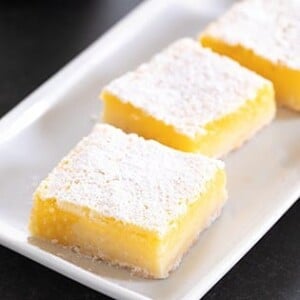
Ingredients
- 1 ⅔ cups (233 g) basic gum-free gluten free flour blend, (click through for simple recipe of superfine white rice flour + potato starch + tapioca starch/flour)
- ½ cup (58 g) confectioners’ sugar, plus more for dusting
- ½ teaspoon kosher salt
- Zest of 1 large lemon
- 9 tablespoons (126 g) unsalted butter, melted and cooled
- 4 (200 g (weighed out of shell)) eggs, at room temperature
- 1 cup (200 g) granulated sugar
- ¾ teaspoon baking powder
- ⅔ cup (5.33 fluid ounces) freshly squeezed lemon juice, juice of 4 to 5 lemons
Instructions
- Preheat your oven to 325°F. Grease an 8-inch square baking pan, line with criss-crossed pieces of parchment paper that overhang the sides, and grease the parchment paper. Set the pan aside.
Make the crust.
- In a medium-sized bowl, combine 1 cup (140 g) of the flour, confectioners’ sugar, salt and lemon zest and whisk to combine, breaking up any clumps of lemon zest.
- Add the butter and mix with a fork until well-combined. Press the mixture into the bottom of the prepared baking dish in an even layer.
- Place the baking dish in the center of the preheated oven and bake for about 15 minutes or until firm.
- Remove from the oven and allow to cool briefly.
Make the custard layer.
- In a medium-sized bowl, place the eggs, granulated sugar, baking powder, lemon juice and remaining 2/3 cup (93 g) flour, whisking vigorously to combine after each addition. Pour the custard mixture into the baked crust.
Bake the bars.
- Return the pan to the center of the oven. Bake until just set (about 25 minutes).
- The custard is set when it does not jiggle more than a tiny bit in the center when the pan is shaken gently back and forth.
- Remove the pan from the oven and allow to cool in the pan for about 20 minutes.
Chill the bars.
- Place in the refrigerator to chill until firm, about 2 hours and up to overnight.
- Remove the bars from the pan by running a butter knife or thin spatula around the perimeter of the baking dish, and then lifting the bars out of the pan by the overhung pieces of parchment paper.
- Dust lightly with confectioners sugar, and slice into 9 or 12 squares with a large knife. Serve chilled.
Video
Notes
Nutrition
Nutrition information is automatically calculated, so should only be used as an approximation.
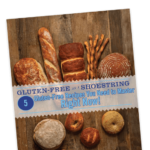
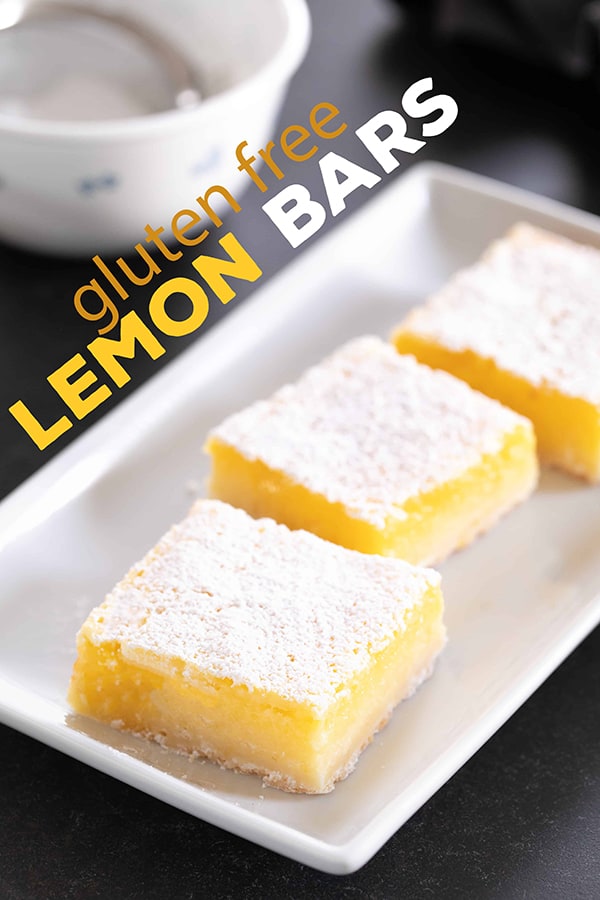
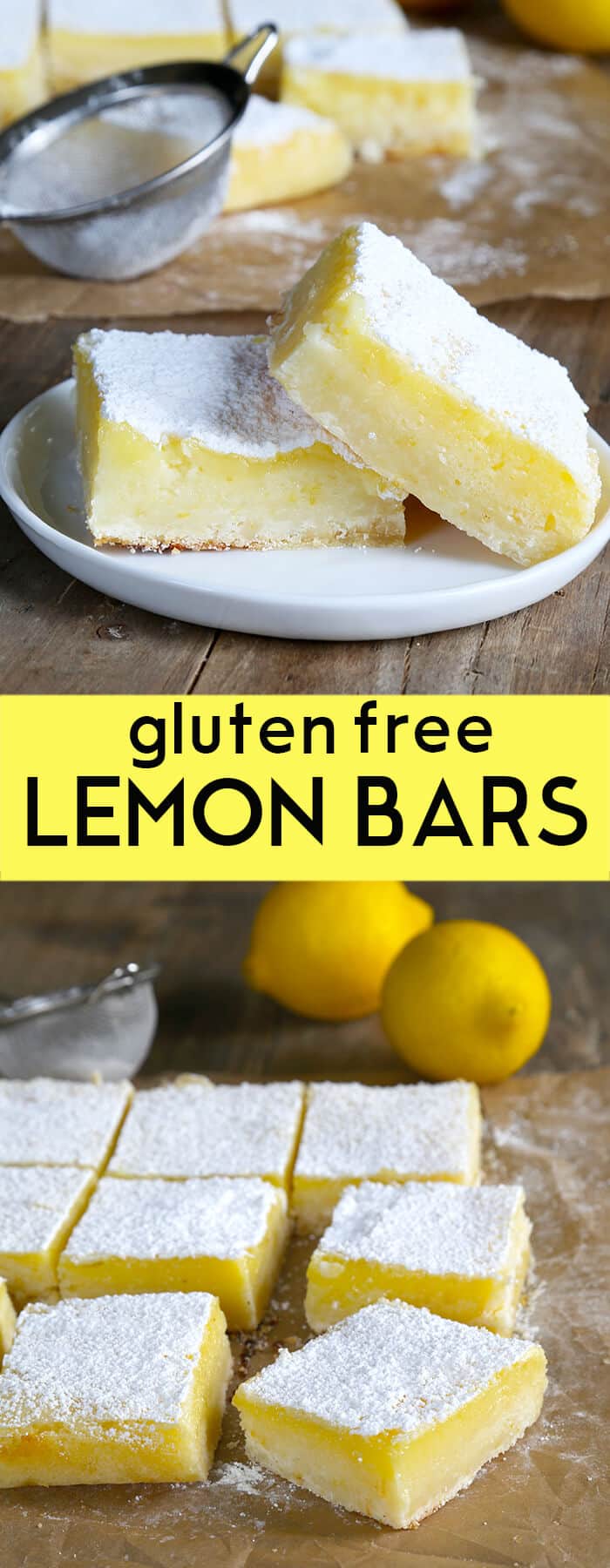
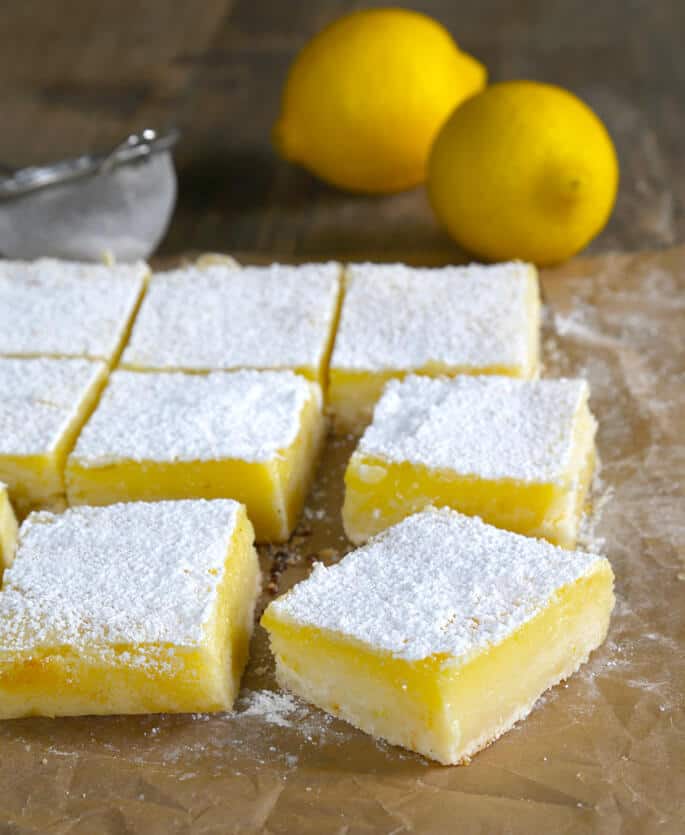
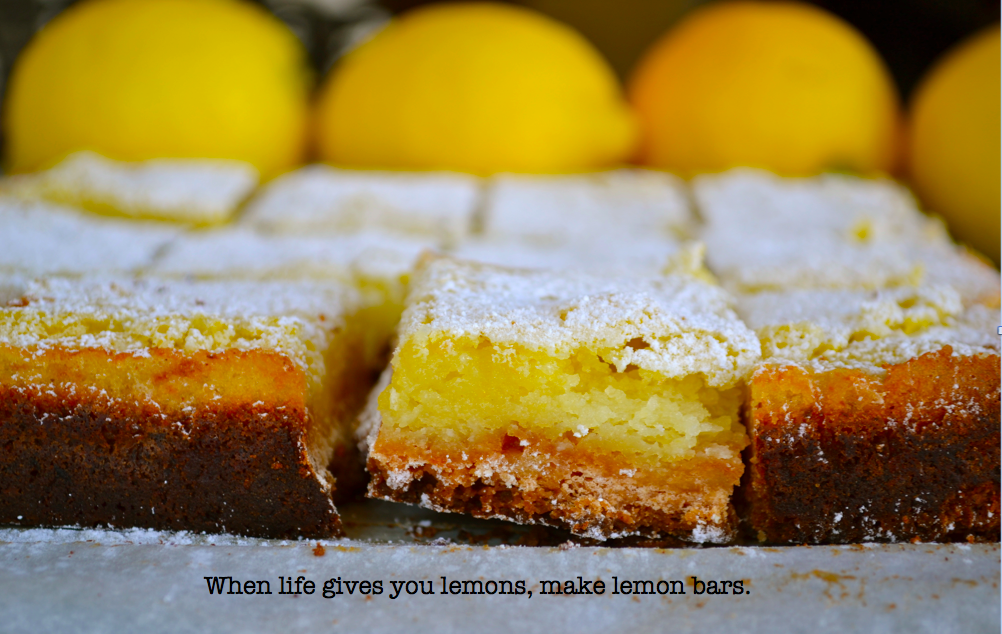

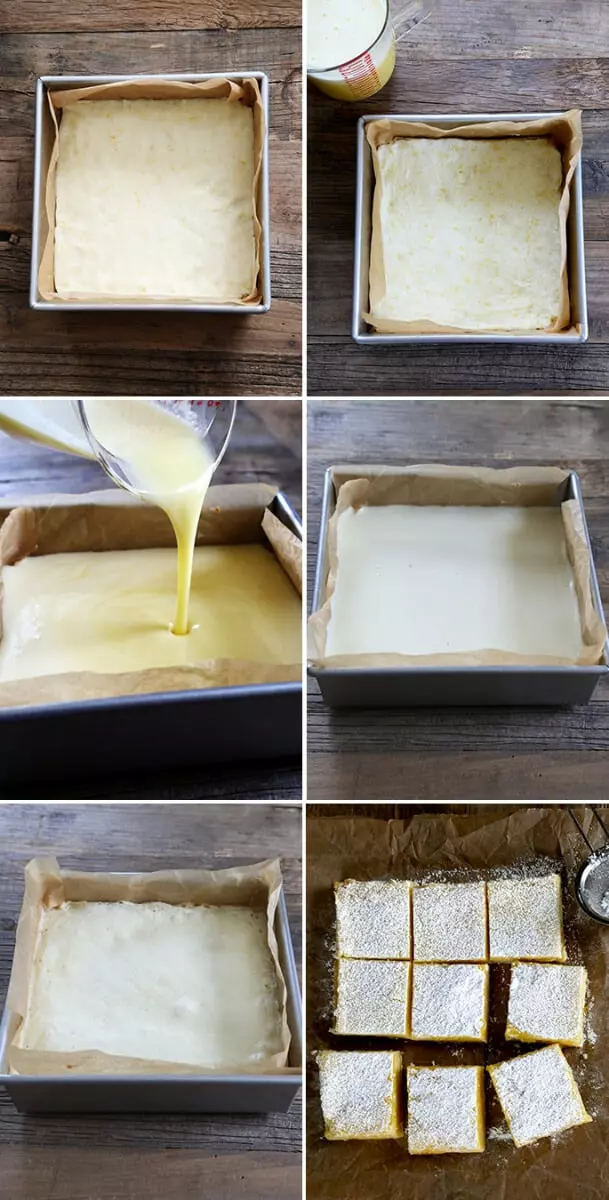
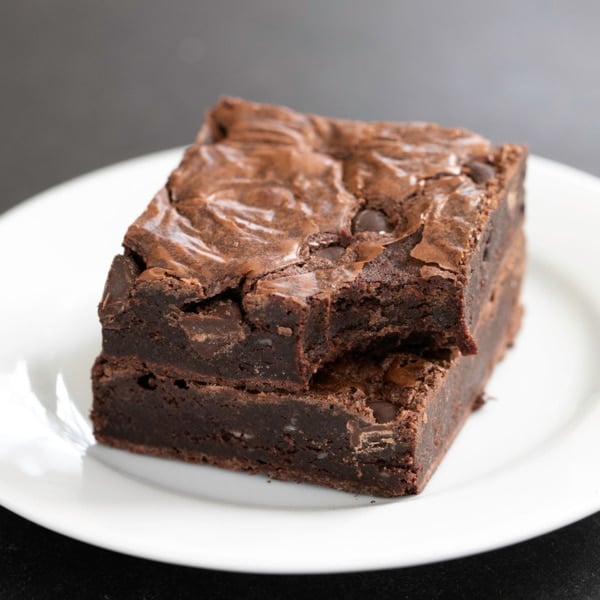
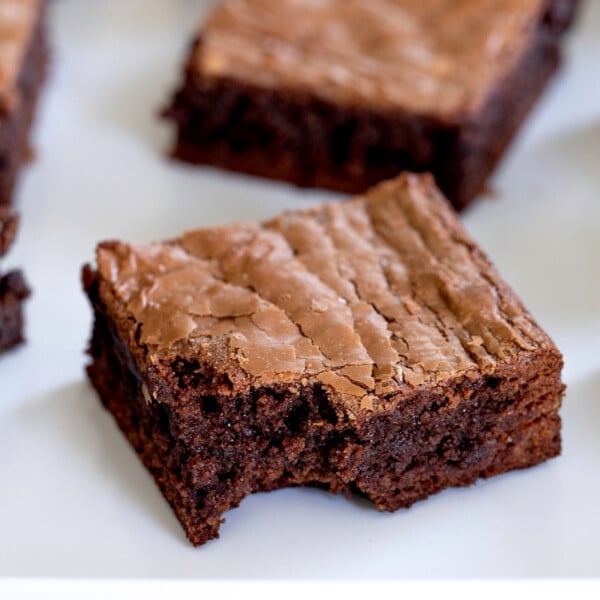
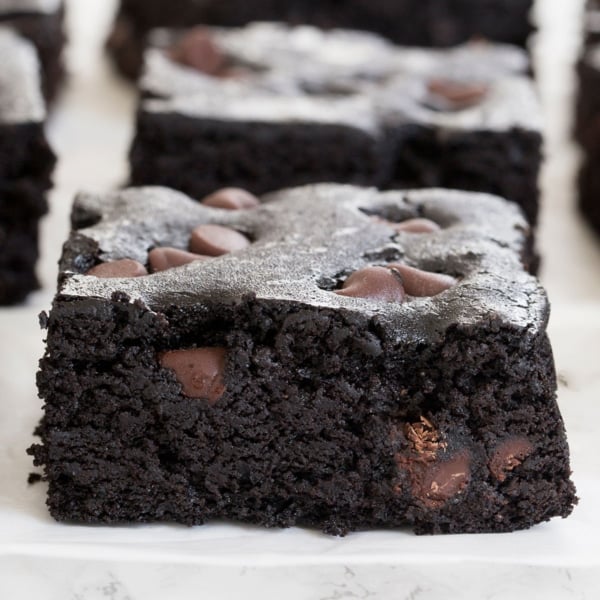
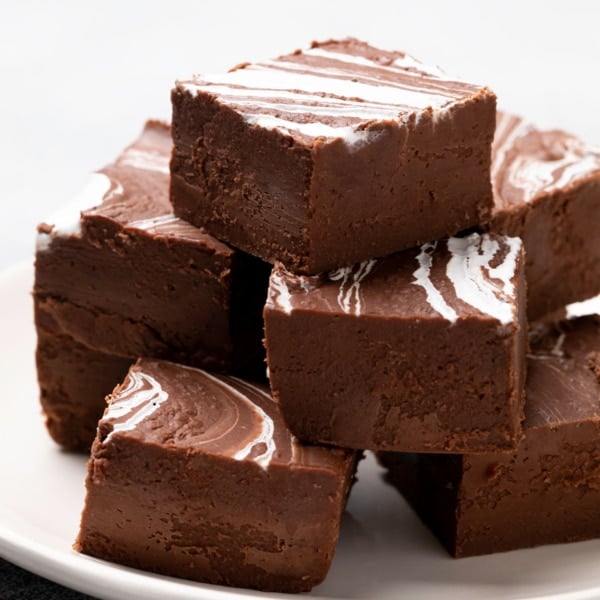









These were very excellent! I made the gf flour mix according to the recipe. No graininess at all. I’m the only gf person in the room but everyone loved it! Custard is so lemony and delicious. Yes be aware you have to do a little maths if you double or triple the recipe, it doesn’t double the lemon zest etc so pay attention but it’s not hard at all :)
Hi, Shannon, I’m so glad you went through the trouble of making the 3-ingredient gum free blend and reaped the rewards! Yes, unfortunately, the recipe card software is only able to multiply information in certain fields, and does not affect narrative information. It’s frustrating, but I’m unable to change it. Thank you for understanding!
Can you use a gluten-free flour that contains gum? As a one time baker, I couldn’t find gluten-free flour that did not contain gum at the grocery store.
No, Jodi, as I explain in the post, the bars will be gummy.
Love this recipe, just like all of Nicole’s! I have made it many times and am making it again to bring to my 101 year-old grandpa who loves lemon bars. There is no justified reason to remove stars because the written word doesn’t change when you double or triple the recipe. If you can’t determine that a tripled recipe doesn’t fit in the same size pan as a single, I guess that’s on you. It’s there as a convenience so you don’t have to do the math. And you should never make anything without first reading through all the instructions, so there’s no reason to not know how to split up the flour. This recipe cooks like a dream and the flavor is spot-on. Thank you Nicole for all your research, testing, and support over the years!
Thank you so much for sharing that, Jennifer, and for your support about the way the software works, over which I have no control. And yes! It is incumbent on every baker to read through a recipe first before beginning, and to use common sense always!
Does this freeze well?
Hi, Cindy, Yes! Please see the text of the post under the subheading “Can you freeze lemon bars?” for my suggestions.
These were really yummy, but for some reason I can’t quite get the center to thicken. The outer edges cook fine, but the center falls when you pick up a slice. Could be my fault, but I followed the recipe to a T :(
Removing one star for not writing directly in the flour line that its measurement is divided between the crust and custard. That’s such an important detail. For anyone else who got caught out, just add a bit more melted butter to the crust and move on. If you don’t learn your lesson the first time, like me, just dump the flour on top of the egg-lemon mixture already in the pan and mix it in with your grandma’s hand blender, being sure to not ding the crust underneath. It’ll turn out fine, and the powdered sugar at the end hides a multitude of sins.
There really needs to be a big obvious note stating the instructions don’t change when you double or triple the recipe! I keep making it wrong as keep forgetting it’s wrong. It’s super frustrating because it’s a great recipe! We love it. But so sad I keep ruining it.
I’m afraid every one of these recipe card software programs does the same thing. It just isn’t coded that way to double the language, which would be much more challenging. I’m not able to control any of that, and it’s across the industry.
In your recipe if you make 1 recipe, or double it, or triple it, the instructions say to bake it in a 8 inch square pan. This can’t be right.
Carol, when you increase the yield, the program only changes the ingredient amounts automatically, not the narrative. You have to make those adjustments yourself. Every recipe card does the same thing. Unfortunately, the program doesn’t support other automations.
Wonderful dessert for my love everything lemon grandson! Used the suggested Dairy Free substitutions and they turned out great!!
Thank you!!
So glad to hear it, Lenora. I love that your grandson got to have the ultimate lemon dessert, and that the dairy free subs worked. Thank you for sharing your experience!